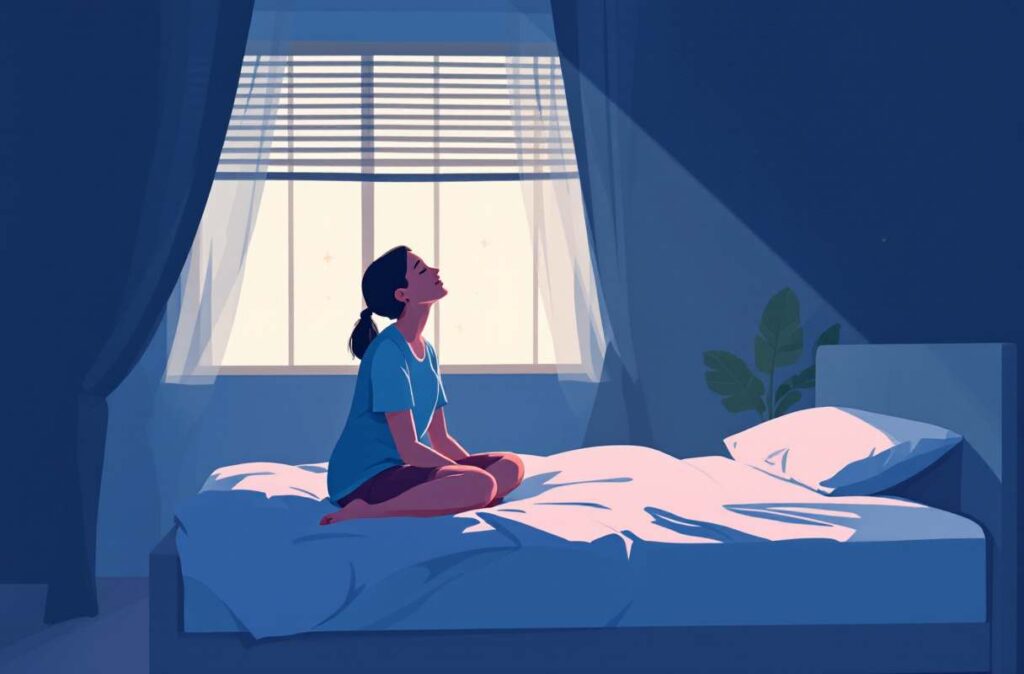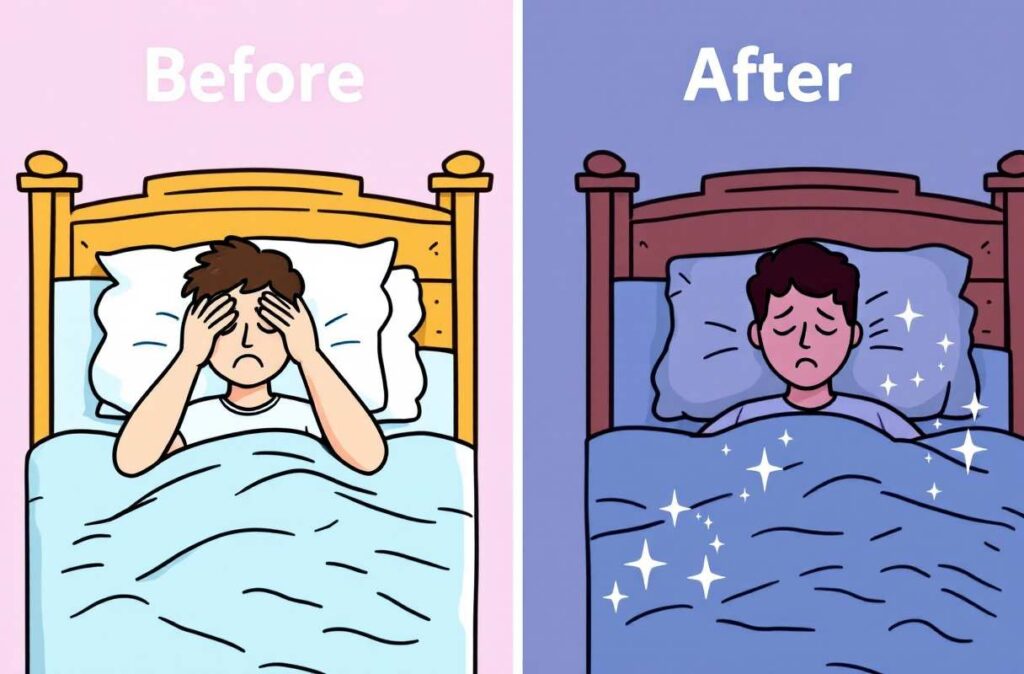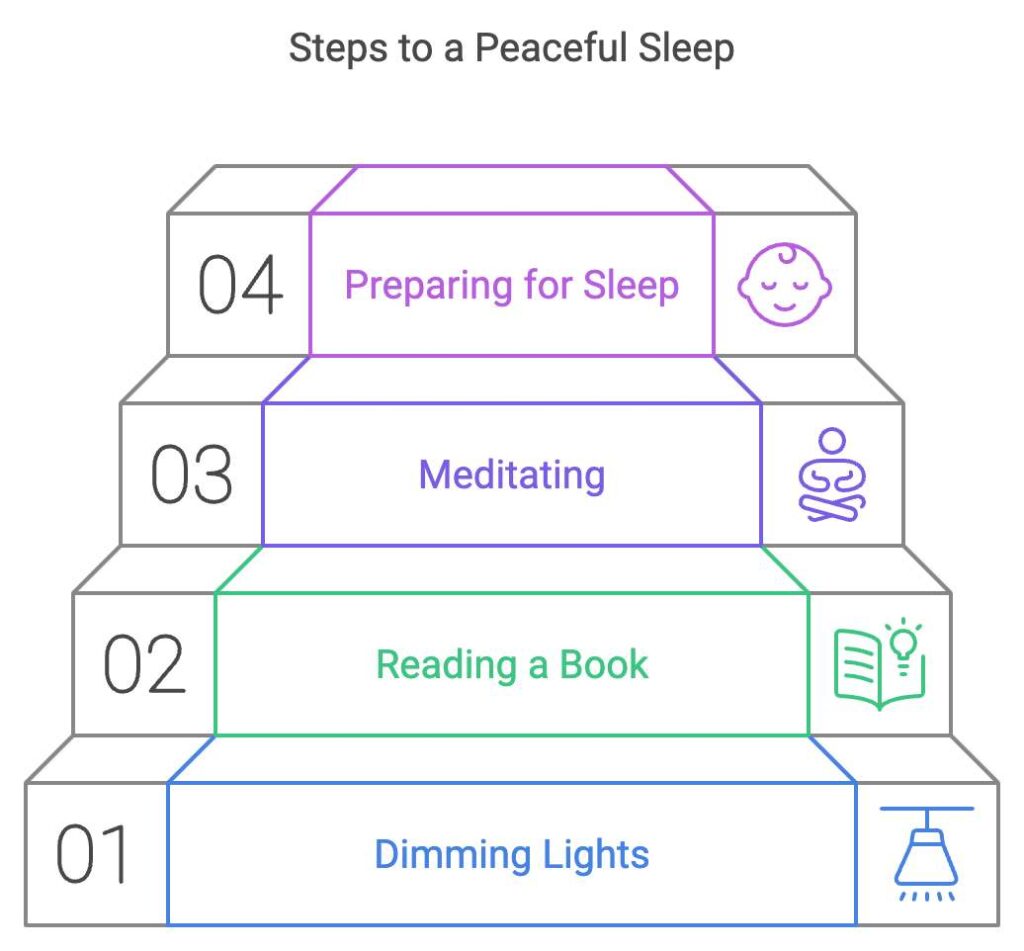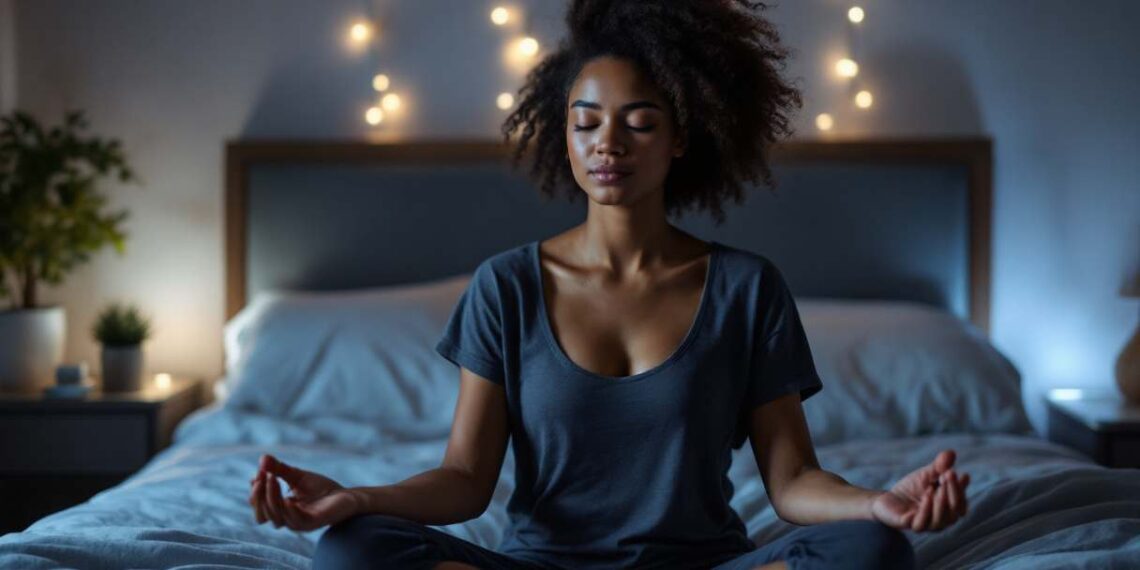Struggling to fall asleep night after night can feel like an endless battle against your own mind and body. Insomnia isn’t just an occasional restless night; it’s a persistent difficulty with falling asleep, staying asleep, or both.
Understanding insomnia is the first step toward reclaiming restful nights and rejuvenated mornings. Let’s delve into what causes this sleep disorder and how meditation might be the key to overcoming it.
Understanding Insomnia
Insomnia’s that annoying guest that overstays their welcome, making bedtime a nightly showdown between you and Mr. Sandman. Whether you’re counting sheep or just counting the hours ’til dawn, this troublesome sleep disorder plays tricks on your ability to drift off, stay snoozing or not wake up with the birds.
“Insomnia is a symptom, not a standalone diagnosis or a disease.” — Dr. William Dement, Sleep Medicine Researcher
Various Types of Insomnia
Cracking the code of your own sleepless nights might just be easier when you know the types of insomnia knocking at your brain’s door. Here’s a lineup of the usual culprits:
| Type of Insomnia | What It Looks Like |
|---|---|
| Acute Insomnia | This guy’s just visiting—hopefully. It pops up for a spell, a few days or weeks, usually when life gets a little too exciting or scary. |
| Chronic Insomnia | Here to stay, this version messes with your zzz’s at least three nights a week for three months or more. Often it’s tied up with other health hiccups. |
| Onset Insomnia | The night owl’s nightmare: you hit the pillow… and nothing. Sleep feels like a pipe dream. |
| Maintenance Insomnia | It’s like your sleep’s on a rollercoaster, waking you up throughout the night and ruining your beauty sleep. |
| Terminal Insomnia | The early riser’s curse. You’re up with the sun and can’t convince yourself to grab some extra snooze. |
Factors Contributing to Insomnia
Turning down insomnia’s volume means spotting what’s causing it to crank up in the first place. Peek at these common offenders:
| What Causes It | What’s the Deal? |
|---|---|
| Stress | Brain won’t turn off? Blame life’s dramas, be it work, money woes, or personal stuff. |
| Medications | Your pills might be having a late-night party and not inviting you to sleep. |
| Health Conditions | Chronic aches, breathing stuff, or a moody mind, like dealing with the blues, all mess with dreamland. Make friends with more info at depression and insomnia. |
| Lifestyle Choices | A little caffeine, wonky sleep timings, or dodgy night routines can rain on your sleep parade. Get your ducks in a row with our sleep hygiene checklist. |
| Age | As you rack up birthdays, your sleep clock might bear some quirks. Get the skinny on it with age-related sleep changes. |
If anxiety’s playing puppet master to your sleep, meditation might just cut those strings. For anyone tangled in the web of another long night, articles like why can’t I fall asleep and how long does insomnia last are like having a friend who’s been there, done that, and bought the T-shirt.
The Power of Meditation for Sleep
Meditation has turned into a handy go-to for better shut-eye. It’s got the tricks to help you kick back and take it easy, making snoozing a breeze.
How Meditation Affects Sleep
Meditation mixes things up by chilling out your brain and dialing down stress in your body. When people get their zen on, they slip into a laid-back state that fights off the jitters linked to insomnia. It can knock down stress bosses like cortisol, making it easier to hit the hay.
Studies back this up, showing that regular meditation twists your brainwaves for better sleep. One study found that folks who meditated got more of that sweet deep sleep, which is like the remote for a proper recharge. Check out the table below for a snapshot of how meditation connects with better sleep.
| Study Aspect | Effect of Meditation |
|---|---|
| Sleep Latency | Less time staring at the ceiling before nodding off |
| Sleep Duration | More sleep time on the clock |
| Sleep Quality | Feeling like your sleep is top-notch |
| Stress Levels | Lower freak-out levels before bedtime |
Benefits of Meditation for Insomnia
Meditation throws a lifeline to those wrestling with insomnia. Here’s why it’s a game-changer:
Kicking Anxiety to the Curb: It slashes anxiety and the endless mental racket that messes with your sleep vibe. Especially helpful for those balancing insomnia and anxiety.
Relax and Unwind: Meditation nudges both body and mind into a chill zone, making lounging into dreamland easier.
Boosting Sleep Quality: Regular meditative practice means deeper, more satisfying slumbers, which your body thanks you for.
Self-Awareness Perks: It nudges you to get closer to your own thoughts and emotions, helping you handle stress better.
Cutting Down on Meds: Using meditation may push sleep meds to the back of your cupboard, dodging those pesky side effects. It’s a neat add-on if you’re on meds that mess with sleep.
Meditation doesn’t just spice up your sleep—it hands over the wheel to help you snag that restful night back. Mixing these techniques with broader strategies like a sleep hygiene checklist and insomnia-busting exercises can make for a solid plan to tackle insomnia.
“Meditation can help you accept those thoughts, let them go, and find your way into a deep, restorative sleep.” — Dr. Herbert Benson, Mind-Body Medicine Pioneer
Meditation Techniques for Sleep
Having trouble catching those Zzz’s? Adding a little meditation into your bedtime ritual could help squash insomnia. Different methods suit various tastes and needs, offering a relaxing approach to upping your sleep game. Here’s a nifty trio of meditation tricks to tuck you in nice and cozy.
Mindfulness Meditation
Mindfulness meditation is all about zoning in on the now. You get to watch your thoughts float by without labeling them good or bad. This chill approach lets you lock in on your breathing, shooing away those zooming thoughts that mess with your sleep. With mindfulness, you foster a peaceful vibe, making it a breeze to nod off.
| Technique | Duration | Benefits |
|---|---|---|
| Mindfulness Meditation | 5-20 min | Kicks stress and anxiety; sharpens focus; boosts well-being |
Kick things off by plopping down in a comfy spot and shutting your eyes. Take long, deep breaths, feeling your chest rise and fall. If your mind starts to wander (and it will), gently bring your focus back to your breath. Easy-peasy.

Body Scan Meditation
Body scan meditation means tuning in to each part of your body one by one. You learn where tension’s loitering around and slowly put those muscles in chill mode. By inching from your toes up to your noggin, you sink into a state of deep relaxation.
| Technique | Duration | Benefits |
|---|---|---|
| Body Scan Meditation | 10-30 min | Loosens muscle tension; ups body awareness; invites calm |
Lie flat, get comfy, and shut those eyes. Mentally hop from one body section to the next, starting at your toes. Picture tension slipping away with each breath. Ah, there’s that aah feeling, perfect for snoozing.
Guided Visualization Meditation
Guided visualization meditation lets you dream up calming scenes to escape the day’s stress. Picture yourself somewhere chill—this can be super handy if sleep’s been dodging you. Let guided recordings or apps paint mental peaceful getaways for you.
| Technique | Duration | Benefits |
|---|---|---|
| Guided Visualization Meditation | 10-20 min | Deep relaxation; goodbye stress; hello sleep |
Load up some soundtracks or apps that narrate soul-soothing places, mellow scenes, or calming tales. Let these experiences whisk you far from worries, allowing for snugly slumbers.
These meditation paths can seriously twist insomnia’s arm. By slotting mindfulness, body scanning, and guided visualization into your pre-bed routine, you just might score some sweet dreams. For pointers on tackling insomnia, check out how long does insomnia last and snag our sleep hygiene checklist.
Tweaking Meditation for Those Sleepless Nights
Meditation’s like that secret trick up your sleeve when insomnia knocks on your door. Different sleep troubles call for different magic moves. Check out these cool meditation tricks to help you snooze based on your personal sleep saga.

When Sleep Just Won’t Stick
Ever toss and turn endlessly? Chronic insomnia has a knack for that. Keeping a regular meditation groove can soothe the brain and get the body ready for some shut-eye. Stuff like mindfulness meditation lets you see those wild thoughts and just wave ’em goodbye, bringing in some much-needed chill.
| Technique | Duration | Good Vibes |
|---|---|---|
| Mindfulness Meditation | 10-20 min | Clears the mind, wakes up awareness |
| Body Scan Meditation | 15-30 min | Boosts body vibe check, melts tension |
Chronic insomniacs can try stuff like sleep restriction therapy to up their sleep game.
Baby Blues and Bruised Sleep
New moms and dads, we see you. Those tiny humans keep you on your toes, messing with your Zs. Quick and mellow meditation breaks can grab pockets of peace amidst the chaos. Guided visualization can mentally take you to a cozy, snug cocoon.
| Technique | Duration | Good Vibes |
|---|---|---|
| Guided Visualization | 5-15 min | Soothes the soul, trims stress |
| Breathing Exercises | 5-10 min | Sharpens focus, quiets the mind |
Check out pregnancy insomnia remedies for more sleep hacks when you’ve got a mini-me in tow.
Night Owl Shuffle for Shift Workers
Got that work schedule flipping your sleep on its head? Shift workers, this one’s for you. Plugging into a meditation sesh that throws bedtime signals to your brain helps you hit the hay, no matter the clock. Body scan meditation wraps you in a cozy blanket of safety and rest.
| Technique | Duration | Good Vibes |
|---|---|---|
| Body Scan Meditation | 15-30 min | Relaxes muscles like a pro |
| Evening Meditation | 10-20 min | Winds you down, radiates calm |
Teaming up exercise for insomnia with meditation can iron out those scrunched muscles too.
Anxious Minds, Sleepless Nights
When anxiety and stress turn into nighttime bullies, meditation can be your shield. With mindfulness and guided imagery, transform stress into a chilled-out haven.
| Technique | Duration | Good Vibes |
|---|---|---|
| Mindfulness Meditation | 10-20 min | Kicks anxiety, welcomes calm |
| Guided Imagery | 10-15 min | Strolls through a dreamland, lifts tension |
With more on insomnia and anxiety, you can fine-tune your meditation to tackle stress-induced sleep battles.
When Aging Shuffles Sleep
Older folks often find sleep doing an unexpected dance. Meditation calms the chaos and smoothly ushers you into dreamland. Breathing exercises and mindfulness set the perfect stage for snoozing.
| Technique | Duration | Good Vibes |
|---|---|---|
| Breathing Exercises | 5-15 min | Relaxes and soothes |
| Mindfulness Meditation | 10-20 min | Balances the soul |
Exploring connections with depression and insomnia can also highlight sleep solutions for the wiser crowd.
Mixing and matching meditation tricks with your sleep dilemmas makes sure you hit the sweet spot of restful nights and dreamy mornings. Sleep tight!

Creating a Meditation Routine for Better Sleep
Establishing a meditation routine can really boost how well you sleep. By weaving certain practices into your daily schedule, you can better tackle insomnia and generally snooze better.
Getting Into a Bedtime Groove
Locking down a steady bedtime routine is like telling your body, “Hey, it’s chill-out time.” You might dim the lights, grab a good book, or meditate. Doing this consistently at the same time each day is like tuning up your body’s internal alarm.
| Activity | About How Long? |
|---|---|
| Dimming lights | 10 minutes |
| Reading | 15 – 30 minutes |
| Meditation | 10 – 20 minutes |
| Sleep prep | 10 minutes |
Picking Your Meditation Moment
While you can meditate whenever, the sweet spots are usually before hitting the hay or during those tiny breaks in the day. Picking a time that vibes well with your daily rhythm helps make it stick.
| Time Slot | What’s in it for ya? |
|---|---|
| Early evening | Gets your mind all set for some solid sleep |
| Right before bed | Cranks up relaxation right before snoozing |
| Midday | Gives you a little escape from daily chaos |
Sneaking Meditation into Your Day
If insomnia’s got you down, making meditation a regular thing is super important. Giving it its own spot in your day can lead to sleep perks over time. Set reminders or alarms if that helps keep you on track.
| Daily Practice Idea | How Long Ya Got? |
|---|---|
| Morning meditation | 5 – 10 minutes |
| Midday chill-out | 5 minutes |
| Evening unwind session | 10 – 20 minutes |
Plus, there’s some other tricks up your sleeve. You could try following a sleep hygiene guide or munching on sleep-friendly foods. Pair these with meditation, and you might just handle insomnia better.
Conclusion
Insomnia doesn’t have to control your nights and derail your days. By understanding its causes and embracing meditation techniques tailored to your sleep challenges, you can pave the way toward restful slumber. Establishing a consistent meditation routine, combined with healthy sleep hygiene practices, empowers you to take back control of your sleep health. Remember, it’s about finding what works best for you and making it a peaceful part of your daily life.
FAQs
- What are the common types of insomnia?
Insomnia can be acute (short-term) or chronic (long-term). Common types include onset insomnia (difficulty falling asleep), maintenance insomnia (trouble staying asleep), and terminal insomnia (waking up too early). - How does meditation improve sleep for those with insomnia?
Meditation promotes relaxation by calming the mind and reducing stress hormones like cortisol. This relaxation response can make it easier to fall asleep and improve sleep quality by reducing anxiety and tension. - Which meditation techniques are best for combating insomnia?
Techniques such as mindfulness meditation, body scan meditation, and guided visualization are particularly effective. They help in reducing racing thoughts and physical tension that interfere with sleep. - How can I incorporate meditation into my bedtime routine?
Start by setting a consistent bedtime schedule. Choose a quiet, comfortable space and practice your preferred meditation technique for 10-20 minutes before sleeping. Consistency is key to seeing benefits. - Can meditation replace sleep medication for insomnia?
While meditation can significantly improve sleep quality and reduce insomnia symptoms, it’s important to consult a healthcare professional before making changes to any prescribed medication regimen.
Additional Resources
- National Sleep Foundation: Understanding Insomnia
National Sleep Foundation – Insomnia - Mayo Clinic: Insomnia Treatments and Drugs
Mayo Clinic – Insomnia Treatments - Harvard Health Publishing: Meditation for Sleep
Harvard Health – Meditation and Sleep








